10 Most Sustainable Men’s Clothing Brands: The Conscious Consumer’s Guide
Affiliate Disclosure
Hey fellow impactful ninja ?
You may have noticed that Impactful Ninja is all about providing helpful information to make a positive impact on the world and society. And that we love to link back to where we found all the information for each of our posts.
Most of these links are informational-based for you to check out their primary sources with one click.
But some of these links are so-called "affiliate links" to products that we recommend.
Why do we add these product links?
First and foremost, because we believe that they add value to you. For example, when we wrote a post about the environmental impact of long showers, we came across an EPA recommendation to use WaterSense showerheads. So we linked to where you can find them. Or, for many of our posts, we also link to our favorite books on that topic so that you can get a much more holistic overview than one single blog post could provide.
And when there is an affiliate program for these products, we sign up for it. For example, as Amazon Associates, we earn from qualifying purchases.
What do these affiliate links mean for you?
First, and most importantly, we still only recommend products that we believe add value for you.
When you buy something through one of our affiliate links, we may earn a small commission - but at no additional costs to you.
And when you buy something through a link that is not an affiliate link, we won’t receive any commission but we’ll still be happy to have helped you.
What do these affiliate links mean for us?
When we find products that we believe add value to you and the seller has an affiliate program, we sign up for it.
When you buy something through one of our affiliate links, we may earn a small commission (at no extra costs to you).
And at this point in time, all money is reinvested in sharing the most helpful content with you. This includes all operating costs for running this site and the content creation itself.
What does this mean for me personally?
You may have noticed by the way Impactful Ninja is operated that money is not the driving factor behind it. It is a passion project of mine and I love to share helpful information with you to make a positive impact on the world and society. However, it's a project in that I invest a lot of time and also quite some money.
Eventually, my dream is to one day turn this passion project into my full-time job and provide even more helpful information. But that's still a long time to go.
Stay impactful,
Amid growing concerns about the textile industry’s environmental impact, there is pressure to find greener clothes for your wardrobe, from a winter jacket to an everyday T-shirt. Unfortunately, fashion greenwashing makes it harder for you and all other consumers to figure out which clothing brands offer the most eco-friendly garments. So, we had to ask: Which are the most sustainable men’s clothing brands?
The most sustainable men’s clothing brands are Taylor Stitch, Neem, and ISTO., which reduce carbon footprint, employ traceability, and strive for circularity. In addition, CARASUS and Vustra prioritize low-impact, natural, and organic fabrics to reduce their environmental impacts.
Whether you are searching for some comfortable everyday menswear or some special occasion pieces to add to your wardrobe without negatively impacting the soil, the water, the animals, and other people, there is a brand for you. So, let’s keep reading to learn more about the most sustainable men’s clothing brands and how they ensure sustainable, ethical practices.
Here’s How We Selected the Most Sustainable Men’s Clothing Brands
The fast fashion industry has pushed for a lot of menswear to be trend-dependent and easily replaceable, leading to the huge adverse environmental impacts of making and landfilling garments, especially when those garments are made with certain high-impact materials such as virgin polyester, animal-derived leather, or conventional cotton.
“Sustainable: The ability to be maintained at a certain rate or level | Avoidance of the depletion of natural resources in order to maintain an ecological balance”
Oxford Dictionary
The brands on this list were chosen based on their commitment and actions to promote sustainable practices while reducing the environmental impacts of the textile industry.
They are transparent about their materials, processes, and workforce management within their supply chain.
Some brands focus their efforts on reducing waste and optimizing natural resources while others strive to reduce the carbon footprint of their clothes.
All of these brands share the commitment to reshape the textile industry toward a more sustainable and Earth-friendly sector.
These Are the 10 Most Sustainable Men’s Clothing Brands
Most Sustainable Men’s Clothing Brands
Overall, these men’s clothing brands are sustainable. Yet, they take various approaches to reduce environmental impacts and uphold ethical standards. Let’s dive into each brand and find out more.
Taylor Stitch: Responsibly Built Men’s Clothing
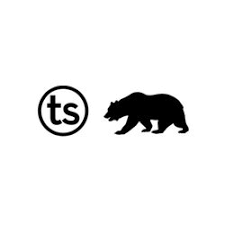
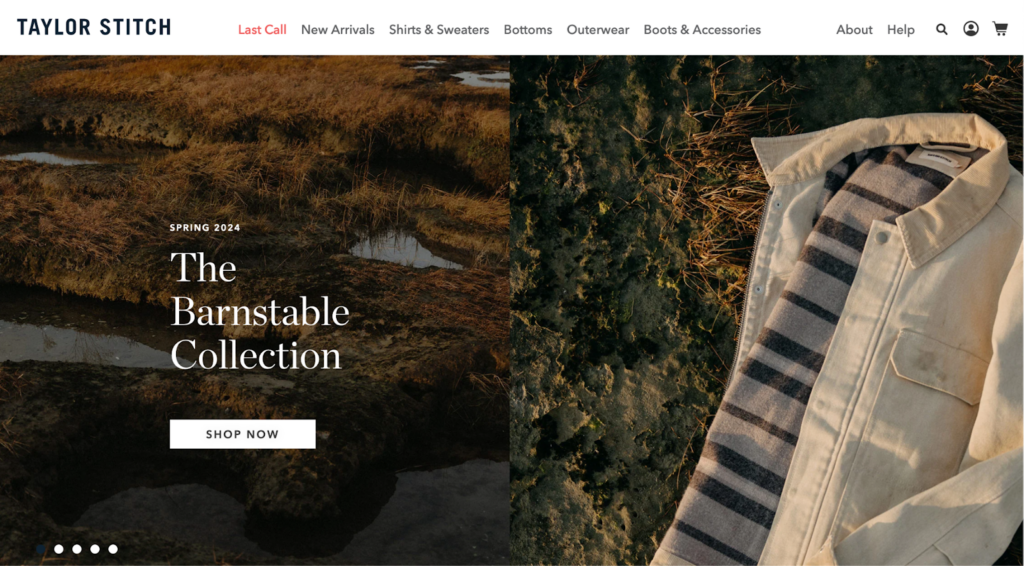
“From fiber to fabric to factory to end functionality, Taylor Stitch has grown from a need for products without limitations that could handle chopping wood, surf sessions, snagging trout, or simply heading to the office. On top of making the world’s best apparel, we’re asking questions about how we can protect wild, forever.”
Taylor Stitch
🌎
How do they ensure their sustainability?
Taylor Stitch promotes sustainability by sourcing a high proportion of lower-impact materials, reducing climate impact, and closing the loop toward being circular. Firstly, they commit to, wherever possible, using organic, regenerative, or recycled fibers. In particular, Taylor Stitch uses organic cotton, which accounts for 99% of all their cotton fabrics. They also use low-impact plant-based fibers like linen and hemp in blends with recycled synthetic fabrics, such as in the composition of the Boss Duck fabric. Secondly, Taylor Stitch reduces their climate impact by reducing their carbon footprint and offsetting all emissions resulting from both shipments to customers and trans-Pacific freight from their factories. In particular, their offset project benefits the Jari Pará area of the Amazon rainforest. Lastly, their efforts toward textile circularity include designing timeless and durable products, offering lifetime repair and replacement, recovering, reusing, or donating deadstock, and operating a buy-back program, Restitch. The brand buys back their worn-out pieces, which they then reconstruct into unique new garments. This helps further reduce textile waste as the brand strives toward fashion circularity.
🌐
How do they ensure their ethics?
Taylor Stitch traces part of their supply chain. They publicly share their factory partners, which are located in China, Mexico, and the US. Regarding animal welfare, they opt for ethical practices when developing animal-based products, such as byproduct-sourced leather, non-mulesed wool, and recycled down.
🤝
Are they part of any giving-back programs?
Taylor Stitch donates to local and national organizations, including Frontline Foods, World Central Kitchen, ACLU, Campaign Zero, The Hidden Genius Projects, NSW Rural Fire Service, and the Foundation for National Parks & Wildlife.
🛍️
What is their product range?
- Best for: menswear
- Product range: shirts, T-shirts, bottoms, outerwear, boots, accessories
- Price range: $$
- Size range: XS–XXL
Neem: Men’s Tops From a Carbon-Neutral Production System


“We have measured the waste, energy, GHG, and water usage through a life cycle analysis, to fully understand the environmental impact of what we are producing.”
Neem
🌎
How do they ensure their sustainability?
Neem prioritizes sustainability by sourcing a high proportion of low-impact materials, offsetting their carbon emissions, and striving to close the loop in fashion. Firstly, their clothes are made with recycled, regenerative, and renewable fibers, including recycled cotton, regenerative cotton, and regenerative ZQ merino wool. Secondly, they aim to reduce their climate impact by reducing and offsetting their carbon footprint. Neem partners with Green Story to identify ways to cut down emissions, including using renewable energy in the supply chain and keeping manufacturing close to their base. Furthermore, they offset all their production emissions in three charities: Harmalik Wind Power Plant in Turkey, Reforestation in Peru, and Safe Community Water in Rwanda. Their end-to-end production system is 100% carbon neutral. Lastly, Neem strives toward fashion circularity by using recycled fibers, offering clothes repair services, and recycling clothes from any brands.
🌐
How do they ensure their ethics?
Neem traces most of their supply chain. Specifically, their recycled cotton, regenerative cotton, and merino wool products are fully traceable from farming or recycling/shredding to weaving and apparel making. Regarding their climate impact, they share the life-cycle water usage, energy demand, and carbon emissions of their shirts so that consumers are aware of the impact when buying their products.
🤝
Are they part of any giving-back programs?
Neem is not known to be part of any giving-back programs.
🛍️
What is their product range?
- Best for: menswear
- Product range: overshirts, comfort shirts, shirts, popover, T-shirts, polos, accessories
- Price range: $$$
- Size range: S–XXL
ISTO.: Men’s Clothing Made Transparently With Natural Fibers
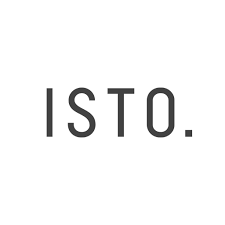
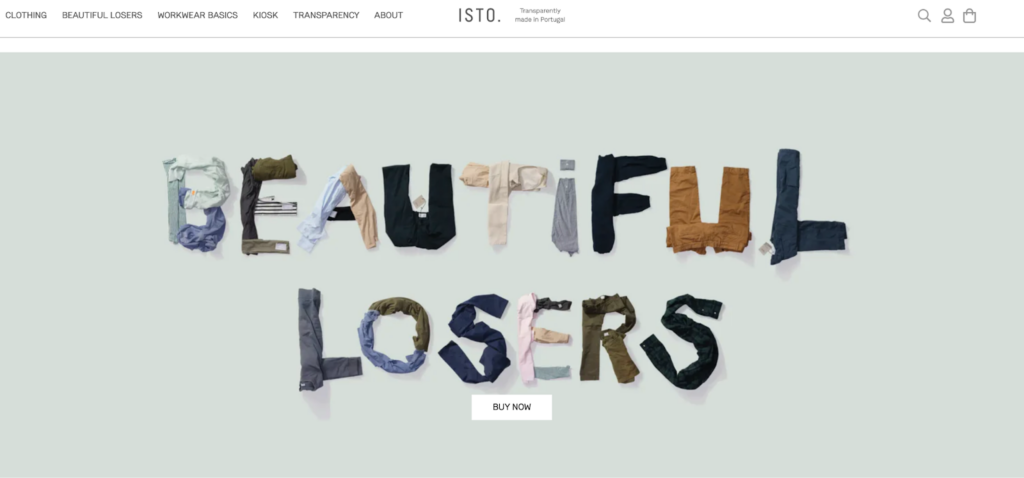
“We care for everyday clothes that fit our everyday needs. That’s why we have one single collection and try to make it permanently available. We look for fashion staples that could be better and work on those until we feel they are done perfectly.”
ISTO.
🌎
How do they ensure their sustainability?
ISTO.’s sustainability efforts focus on using low-impact materials and lowering carbon emissions. Firstly, they prioritize natural fabrics that biodegrade at the end of their life. Bio-based fibers account for 95% of 2023’s collection, of which 56% is organic cotton. ITSO. also opts for lower-impact versions of commonly used fibers like cotton and wool. Specifically, they source GOTS-certified organic cotton, regenerative cotton, recycled wool, merino wool, and vegetable-tanned leather. On top of that, ISTO. uses linen, a fiber that requires considerably fewer resources than cotton or polyester (such as water, energy, pesticides, insecticides, and fertilizers). Secondly, ISTO. sources and produces locally to reduce their transporting carbon footprint. The yarns that are used in their fabrics are sourced exclusively from European countries, including Portugal (74%), Italy (14%), UK (5%), Spain (5%), and France (2%). Regarding the final production stage, 97.5% of their products are finished in Portugal, and the rest in Italy. Lastly, ISTO. provides a general care guide and care details for each type of fabric used in their collection, enabling consumers to extend their garments’ lifespan and reduce the life-cycle impact.
🌐
How do they ensure their ethics?
ISTO. is committed to traceability, helping their customers see the whole journey of their purchase. In 2023, 62% of their products were traceable. Additionally, they produce locally to have more control over their supply chain. ISTO. also audits most of their supply chain and publicly shares their manufacturing partners. As they strive for an even higher level of transparency in their supply chain, ISTO. organize a free tour of the factories they work with to show consumers the process of making their organic staples. As far as each piece of men’s clothing is concerned, the brand provides a cost breakdown of the entire life cycle, traceability score, water usage, and carbon emissions, enabling customers to visualize the impact of their purchase. Regarding animal welfare, they source wool fibers from farms where animals are treated well and live happily. For example, the sheep shearing is done manually in order to not cause any animal distress, and there is no mulesing involved.
🤝
Are they part of any giving-back programs?
ISTO. is not known to be part of any giving-back programs.
🛍️
What is their product range?
- Best for: menswear
- Product range: Shirts, sweatshirts, hoodies, pants, shorts, T-shirts, polos, denim pieces, swim trunks, socks, accessories
- Price range: $$
- Size range: XXS–XXL
CARPASUS: Men’s Shirts Made With Natural and Organic Fibers

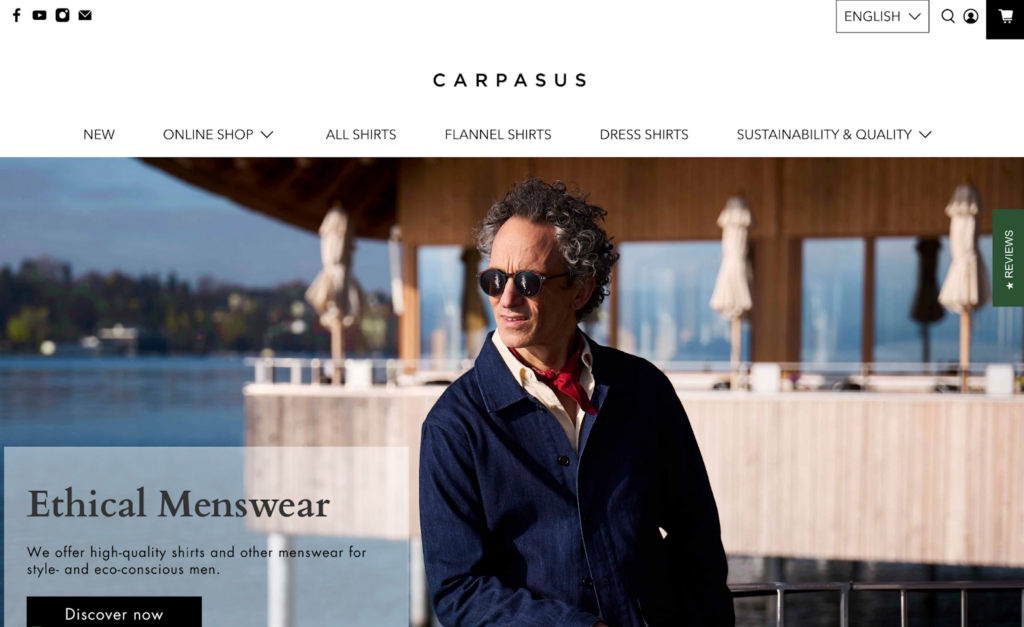
“Ecological and social sustainability are at the center of our economic activities. We want to offer you shirts and other menswear articles that make you feel good and do good to the planet and the people who make them. ”
CARPASUS
🌎
How do they ensure their sustainability?
CARPASUS prioritizes sustainability by sourcing organic and eco-friendly materials. The fabrics of their shirts are made with organic cotton certified by Global Organic Textile Standard (GOTS), linen certified with Alliance for European’s Flax-Linen & Hemp’s Masters of Linen®, recycled cotton, and non-mulesing merino wool with a GOTS certification. The organic cotton fabrics used, for example, in their Populus Flannel Shirt and the Lynx Dress Shirt, are fully traceable from the bioRe® cooperatives in India and Tanzania. CARPASUS also uses low-impact details from natural materials, including the Corozo button and FSC-certified maple wood collar stays. Regarding packaging, they source recycled cardboard for orders sent to consumers and reusable polybags made from recycled plastic for orders sent to their retailers. Further down the life cycle in the manufacturing stage, CARPASUS partners with dyeing, weaving, and shirting suppliers who do not use harmful chemicals and ensure controlled wastewater treatment. Last but not least, they source and produce entirely within Europe, keeping the transport routes as short as possible and the associated carbon emissions as low as possible.
🌐
How do they ensure their ethics?
CARPASUS traces most of their supply chain. They disclose some details of their supply chain, from manufacturing patterns in Portugal and Bosnia-Herzegovina and fabric mills and dyehouses in Portugal, Germany, and Belgium to the farms in bioRe® projects in Tanzania and India. The brand also shares videos to give consumers insights into the steps taken from seeds to shirts, including spinning, weaving, and manufacturing.
🤝
Are they part of any giving-back programs?
CARPASUS is not known to be part of any giving-back programs.
🛍️
What is their product range?
- Best for: menswear
- Product range: flannel shirts, dress shirts
- Price range: $$$
- Size range: XS–XXL
Vustra: Nature-Inspired Men’s Fashion With a Conscience
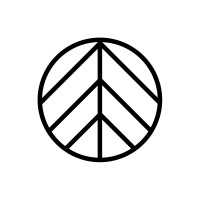

“We design with the longevity of your closet in mind. We want our styles to last you years and years to come, not merely a season. Our apparel is made with high-quality fabrics, in colors and cuts that never go out of style.”
Vustra
🌎
How do they ensure their sustainability?
Vustra ensures their sustainability by sourcing a high percentage of organic and regenerative natural fibers to reduce their ecological impact and carbon footprint. Specifically, they use organic cotton (certified by GOTS, OCS, USDA Organic, and Fairtrade), hemp (certified by OEKO-TEX® and FSC), alpaca wool (certified by OEKO TEX® and FSC), bamboo (certified by OEKO-TEX® and FSC), and organic linen. Vustra also upcycles and recycles to reduce the impact of resource-intensive fabrics like cotton and polyester. Their recycled fabrics are also certified by the Global Recycle Standard. Furthermore, Vustra combines sustainable fibers with low-impact dyes. Lastly, Vustra uses minimal plastic in their packaging and opts for at least 90% recyclable content.
🌐
How do they ensure their ethics?
Vustra is transparent about their manufacturing partners. One of their factories is audited by Supplier Ethical Data Exchange (SEDEX), while the rest is certified with GOTS. Additionally, all items at Vustra are made in Fairtrade-certified factories.
🤝
Are they part of any giving-back programs?
Vustra is not known to be a part of any giving-back program.
🛍️
What is their product range?
- Best for: menswear
- Product range: shackets, shirts, T-shirts, polos, Henleys
- Price range: $$$
- Size range: XXS–XXL
forét: Versatile Clothing as a Friendly Reminder to Go Outside

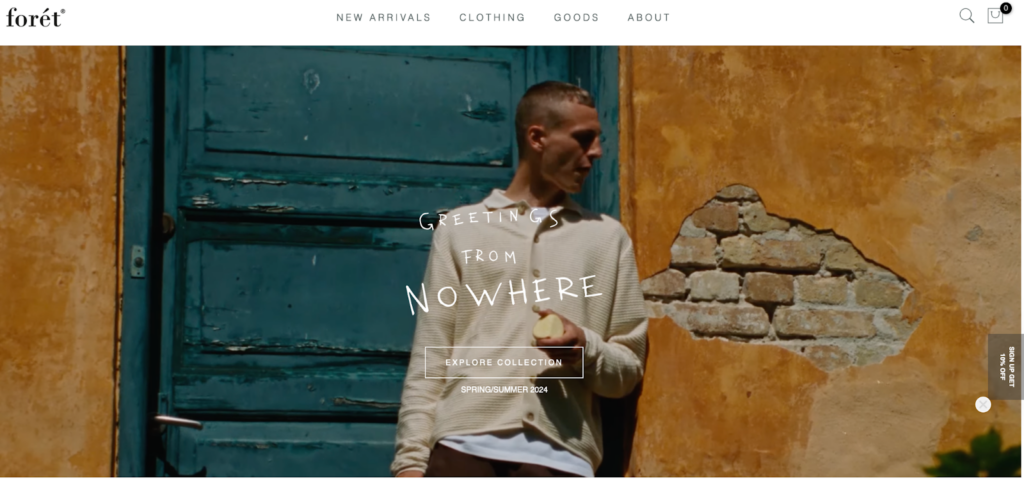
“We keep a close eye on every side of our business, streamlining and developing each part in a responsible way so as to provide slow goods for your journey.”
forét
🌎
How do they ensure their sustainability?
forét ensures their sustainability by creating timeless silhouettes, using carefully selected high-quality fabrics, and paying close attention to every aspect of their products, slowing down the pace to create versatile apparel. Firstly, they design their products to be multipurpose and timeless so whether you are in the office or the woods, you can use them season after season. This philosophy is the opposite of fast fashion’s push for seasonal trends, overconsumption, and wastefulness. Secondly, forét uses a high proportion of eco-friendly materials with credible certifications (Global Organic Textile Standard and Global Recycled Standard). Additionally, they strive to construct their pieces with mono-fiber fabrics to enable recycling at the end of their lifetime. Lastly, forét reduces their climate impact by prioritizing suppliers and manufacturing partners within the EU, shortening the transporting distances.
🌐
How do they ensure their ethics?
forét traces most of their supply chain and audits some of their suppliers.
🤝
Are they part of any giving-back programs?
forét is not known to be part of any giving-back programs.
🛍️
What is their product range?
- Best for: menswear, kidswear
- Product range: shirts, overshirts, sweatshirts, hoodies, pants, shorts, jackets, coats, knitwear, T-shirts, accessories, bags, hats, home goods
- Price range: $$$
- Size range: XS–XXL
Unrecorded: Unisex Clothing Made Sustainably With Consideration to Quality and Elegance

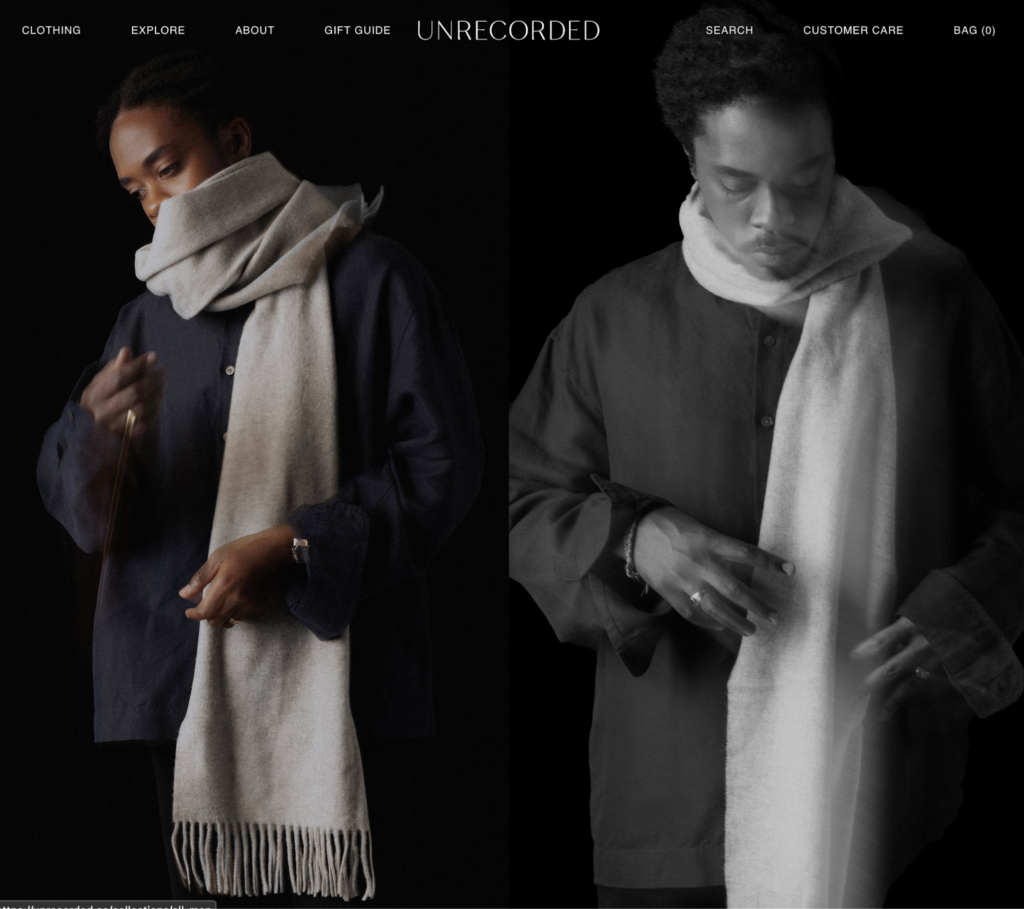
“In our determined pursuit of refinement, we embrace the charm of natural fibers, carefully chosen for their exceptional durability and resilience. ”
Unrecorded
🌎
How do they ensure their sustainability?
Unrecorded ensures sustainability by using a high proportion of low-impact natural fabrics, lowering carbon emissions, and minimizing textile waste. They craft their designs using a selection of natural fibers, including lambswool and sheep wool with RWS certification and from non-mulesed sheep. They also use linen, hemp, recycled cotton, and organic cotton with GOTS certification. Additionally, they strive to incorporate more Dutch-made fabrics to reduce the transporting footprint between sourcing and manufacturing factories in Portugal and Italy. Lastly, all of their orders are shipped in FSC-certified cardboard boxes.
🌐
How do they ensure their ethics?
Unrecorded sets up their final stage of production in the European Union, a low/medium risk region for labor abuse. They also trace most of their supply chain and visit their suppliers regularly. Regarding animal rights, they follow the Responsible Wool Standard, appropriately addressing sheep’s welfare and the land they graze on.
🤝
Are they part of any giving-back programs?
Unrecorded is not known to be part of any giving-back programs.
🛍️
What is their product range?
- Best for: unisex apparel
- Product range: knitwear, sweaters, hoodies, pants, shirts, T-shirts, polo shirts, outerwear, socks, scarves, hats, accessories
- Price range: $$
- Size range: XS–XXL
JCRT: Organic Cotton Men’s Apparel Sustainably Made on Demand


“JCRT is the kinship of culture and cloth. It’s where the subcultural and sartorial meet in a code of color, pattern, and craft.”
JCRT
🌎
How do they ensure their sustainability?
JCRT ensures their sustainability by avoiding unnecessary waste, reducing carbon footprints, and using low-impact finishing chemicals. Firstly, they offer limited-run apparel in an inclusive range of sizes, avoiding large inventory and associated waste. Their products are also digitally printed to save ink. Secondly, JCRT handcrafts their clothing (cutting, sewing, and printing them) and prepares each order from under one roof, lowering the transporting carbon footprint. Lastly, they source Bluesign®-certified chemicals, saving water and avoiding the use of harmful substances.
🌐
How do they ensure their ethics?
JCRT makes their products in their own factory, ensuring fair wages for textile workers.
🤝
Are they part of any giving-back programs?
JCRT raises money and awareness for causes aligning with their values. For example, in 2019, they raised over $10,000 for the Stonewall Gives Back Initiative. In 2020, 20% of every purchase of their products was donated to The Ali Forney Center, the largest agency dedicated to homeless LGBTQ youths.
🛍️
What is their product range?
- Best for: menswear
- Product range: T-shirts, long sleeves, outerwear, sweatshirts, lounge pants, trousers, polos, bags
- Price range: $$
- Size range: XS–4XL
Paka: Outdoor Clothing Made With Traceable Alpaca Wool

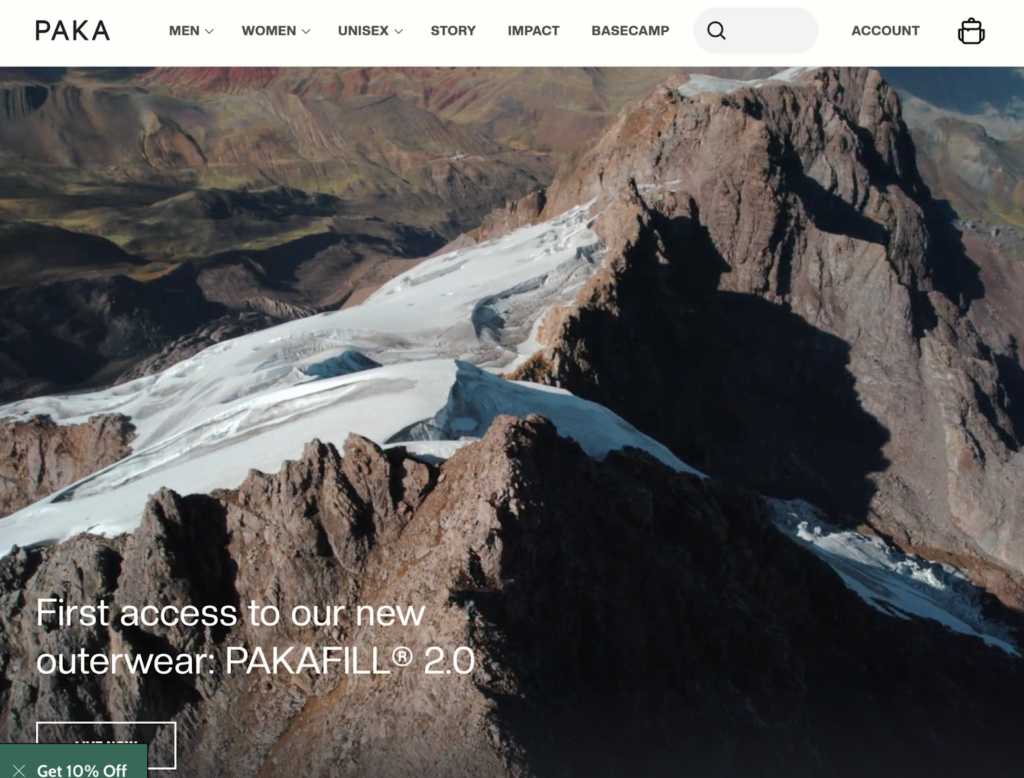
“Paka was created to bring you closer to where your clothing comes from, what it’s made of, and who made it.”
Paka
🌎
How do they ensure their sustainability?
Paka prioritizes sustainability by innovating and making low-impact, high-performing fabrics with ethical alpaca wool. Specifically, they source alpaca wool from small-scale, family-owned herds. Each herd contains 60 to 90 animals roaming free throughout the Peruvian Andean Highlands. After the fleece is shorn, the fiber is collected and separated by hand before being colored (if needed) with environmentally friendly dyes certified by OEKO-TEX® and GOTS. Half of the energy used in their alpaca wool spinning process comes from solar energy. Further down the life-cycle in the transporting stage, Paka alpaca products are delivered in a carbon-neutral manner through their partnership with Ecocart. Their packaging is also fully biodegradable. Last but not least, Paka is a B Corporation.
🌐
How do they ensure their ethics?
Paka ensures their ethics by making their alpaca wool products fully traceable, from free-roaming alpacas up in the Andes Mountains to customers’ homes in the US. The 100+ Quechua women weavers who make Paka’s products are employed by the brand and paid 4 times the family living wage. Regarding alpaca treatment, Paka uses a special technique (Inca Esquila) to minimize the time and stress posed upon the animal during the shearing process.
🤝
Are they part of any giving-back programs?
Through their partnership with Peruvian Hearts, Paka supports the education of underprivileged Peruvian young women with 1% of their annual revenues. Another 1% supports regenerative agriculture and alpaca families. Additionally, they provide free weaving training for women who want to learn a skill, as well as a “Wawa Wasi” (daycare) in the neighborhood, with full-time supervision and a trained psychologist to enable mothers to go to work without worrying about their children. Lastly, Paka is helping to build an NGO that preserves the Inca traditions.
🛍️
What is their product range?
- Best for: women’s and men’s activewear
- Product range: jackets, sweaters, hoodies, baselayer, T-shirts, joggers, socks, underwear, accessories
- Price range: $$$
- Size range: XXS–XXL
Nudie Jeans: Sustainable Denim Jeans Come With Free Repair for Life


“When we started Nudie Jeans in 2001, we decided that environmental awareness and human rights would permeate everything we did.”
Maria Erixon, Co-Founder of Nudie Jeans
🌎
How do they ensure their sustainability?
Nudie Jeans promotes sustainability by sourcing a high proportion of low-impact materials, including organic cotton and recycled cotton. Of all fibers they used in 2022, 95.6% were organic, certified, or recycled fibers. 2022 was the sixth full year in which Nudie Jeans used exclusively certified organic cotton in all their cotton products. Additionally, they ensure their sustainability by using renewable energy in their supply chain to reduce their carbon footprint. Furthermore, Nudie Jeans strives to extend the life-cycle of denim jeans with initiatives to repair, reuse, and recycle. They also offer free repair of Nudie Jeans no matter when or where they were bought at one of their Repair Shops or Repair Partners or by sending jeans owners a free DIY repair kit. In 2022, they repaired 65,386 pairs of jeans for free. On top of that, Nudie Jeans offers a 20% discount after you send in your pre-loved jeans to be washed, repaired, and resold in their Reuse range. In 2022, they sold 3,984 pairs of Reuse jeans. When repairing and reusing are not possible, they put the fabrics, reclaimed from used garments, production seconds, and leftovers, into recycling projects.
🌐
How do they ensure their ethics?
Nudie Jeans strives to be as transparent as possible about how their products are made. The full list of all their suppliers is available for download on their website. Most of these suppliers are certified by Fair Wear Foundation, Fairtrade International – Small Producers Organisations, Global Organic Textile Standard (GOTS), and Sedex Members Ethical Trade Audit – SMETA Best Practice Guidance, ensuring living wages and fair working conditions for workers making Nudie Jeans denim jeans.
🤝
Are they part of any giving-back programs?
Nudie Jeans has donated directly to various charity initiatives. For example, in 2022, they made monetary and jeans donations to UNICEF (to Ukrainian children and their families), Sustainably Crafted Clothing, Räddningsmissionen (The Rescue Mission), Thread Together, and Whitechapel School.
🛍️
What is their product range?
- Best for: menswear, womenswear
- Product range: shirts, hats, scarves, pants, coats, jackets, blazers
- Price range: $$$
- Size range: XS–XL
Why Is It Important to Buy Products Made of More Sustainable Fabrics
It is important to buy products made of more sustainable fabrics because a sustainable textile industry has a lower carbon footprint, helps save natural resources, and is better for forests, animals, and humans.
Buying Sustainable Fabrics Reduces Your Carbon Footprint
The production of clothing and footwear is estimated to contribute 10% of global greenhouse gas emissions—more than all international flights and shipping combined. If the fashion industry were a country, it would be the fourth largest emitter of carbon dioxide.
One way to reduce the carbon footprint of the clothes you buy is to opt for sustainable fabrics. Sustainable fabrics, which are often made with natural or recycled fibers, have relatively low carbon footprints compared to petroleum-based fabrics. For example, organic cotton made in the US has a carbon footprint of 2.35 kg CO2 (per ton of spun fiber)—a quarter of polyester’s carbon footprint.
Buying Sustainable Fabrics Reduces Demand for Natural Resources and Waste Management
The textile industry uses water and land to grow cotton and other fibers. It is estimated that 79 billion cubic meters of water were used for the sector worldwide in 2015. For example, producing a single cotton T-shirt requires as much water as one person drinks for 2.5 years (2,700 liters of fresh water).
Worse yet, the textile economy is vastly more linear than circular: the largest amount of resources used in clothes ended up in landfill (instead of being recycled to remake clothes). According to a report by the Ellen MacArthur Foundation,
- Less than 3% of materials used in the textile economy in 2015 came from recycled sources.
- In other words, more than 97% of resources used in making clothes are newly extracted.
When clothing items are disposed of within a short period of time—under a year in the case of half of the fast fashion clothes—the natural systems that provide raw materials for fabrics don’t have enough time to recover and regenerate, which could lead to ecological breakdown.
Sustainable fabrics are made with less water and emissions while lasting longer:
- Because they are durable, you don’t need to buy new clothes too often.
- Thus, you help reduce the pressure to extract more resources for making new items.
Similarly, making and consuming sustainable fabrics made with recycled materials reduces the demand for virgin materials while helping tackle waste management.
Buying Sustainable Fabrics Encourages Sustainable Management of Forests
Sustainable plant-based fabrics are made with raw materials from forests and plantations that are sustainably managed, such as complying with FSC standards.
When you buy sustainable plant-based fabrics, you discourage unsustainable forestry practices like illegal logging. You can help reduce deforestation, biodiversity loss, and the effects of climate change.
Buying Sustainable Fabrics Encourages Fairer Treatment of Animals
The fashion industry is rife with animal mistreatment when it comes to making animal-based fabrics like wool or silk. Every year, billions of animals suffer and die for clothing and accessories.
Buying sustainable vegan alternatives can help to reduce the pressure on raising more and more animals to meet the demand for animal-based fabrics while sacrificing their well-being and lives.
Suppose you have to buy fabrics made with, for example, wool or silk; make sure you only choose brands committed to cruelty-free products. In that case, you help advocate better treatments for animals raised within the textile industry.
Using Sustainable Fabrics Encourages Fairer Treatment of Textile Workers
Recent statistics from UNICEF estimated as many as 170 million child laborers worldwide, many of whom were engaged in some form of work in the textile industry. They don’t get paid minimum wages and often work long hours.
When you buy sustainable fabrics from brands transparent about the working conditions at their factories, you discourage the use of child labor and help promote better working conditions for textile workers.
How Can You Generally Buy More Sustainable Fabrics
The key to sustainably buying fabrics is to check on relevant environmental and original certifications.
For natural fabrics:
- Global Organic Textile Standard (GOTS): A globally recognized certification system that ensures a certain threshold of organic content has been met. It covers manufacturing, packaging, labeling, transportation, and distribution (but not what happens in the fields where crops are grown).
- USDA Certified Biobased Product: The USDA BioPreferred® Certification is a voluntary certification offered by the United States Department of Agriculture. The certification identifies products made from plants or other renewable materials.
- Ecolabel: Ecolabel is the official European Union voluntary label recognized worldwide for certified products with a guaranteed, independently verified low environmental impact. The label requires high environmental standards throughout the entire life-cycle: from raw material extraction through production and distribution to disposal. It also encourages companies to develop innovative, durable, easy-to-repair, and recyclable products.
For plant-based semi-natural/semi-synthetic fabrics:
- Forest Stewardship Council: An FSC certification ensures that the wood (or wood-like material) comes from responsibly managed forests that provide environmental, social, and economic benefits.
There are two types of FSC Certification:- FSC Forest Management Certification, with a focus on the origin of the wood—the forest.
- FSC Chain of Custody Certification, which focuses on the path from the forest to the customer’s home.
- Program for Endorsement of Forest Certification: PEFC’s approaches to sustainable forest management are in line with protecting the forests globally and locally and making the certificate work for everyone. Getting a PEFC certification is strict enough to ensure the sustainable management of a forest is socially just, ecologically sound, and economically viable but attainable not only by big but small forest owners.
For recycled fabrics:
- Recycled Claim Standard (RCS): The Textile Exchange RCS was originally developed as an international, voluntary standard that sets requirements for third-party certification of Recycled input and chain of custody.
- The Global Recycled Standard (GRS): The Global Recycled Standard (GRS) is an international, voluntary, full product standard that sets requirements for third-party certification of Recycled Content, chain of custody, social and environmental practices, and chemical restrictions. It can be used for any product with more than 20% recycled material.
For all types of fabrics:
- STeP by OEKO-TEX®: STeP by OEKO-TEX® is an independent certification system for brands, retailers, and manufacturers from the textile and leather industry. It communicates organizational environmental measures, including reducing carbon footprint and water usage.
- OEKO-TEX® Standard 100: OEKO-TEX® labels aim to ensure that products pose no risk to human health (i.e., containing banned chemicals).
Some certifications that are signaling brands’ efforts toward lowered environmental impacts and a circular economy are:
- B Corp Certification: The label B Corp is a certification reserved for for-profit companies. Certified holders are assessed on their social and environmental impacts.
- Cradle2Cradle certification: Cradle2Cradle provides a standardized approach to material circularity. It assesses whether products have been suitably designed and made with the circular economy in mind covering five critical categories: material health, material reuse, renewable energy and carbon management, water stewardship, and social fairness.
Final Thoughts
Among the issues of the fast fashion industry, clothing items that are easily replaceable and influenced by trends stand out in particular–and menswear clothing is no exception. This leads to the huge adverse environmental impacts of making and landfilling various garments, especially with certain high-impact materials.
By purchasing new or pre-loved menswear from brands that commit to sustainability, you support their mission to create a fairer and less harmful textile industry for all lives on Earth.
Here is the list (again) of the most sustainable men’s clothing brands:
- Taylor Stitch
- Neem
- ISTO.
- CARPASUS
- Vustra
- forét
- Unrecorded
- JCRT
- Paka
- Nudie Jeans
To make your use of these menswear clothing items even more sustainable, follow these steps:
- Buy second-hand, recycled, or upcycled menswear made with low-impact materials.
- While using, maximize the number of wears between washes and keep them as long as possible.
- At the end-of-life of your clothes, upcycle the materials to extend their usage and arrange for them to be recycled or properly disposed of.
Stay impactful,

Sources
- Impactful Ninja: How Sustainable Are Polyester Fabrics? A Life-Cycle Analysis
- Impactful Ninja: How Sustainable Are Leather Fabrics? A Life-Cycle Analysis
- Impactful Ninja: How Sustainable Are Cotton Fabrics? A Life-Cycle Analysis
- Science Direct: Life-cycle assessment (LCA)
- Taylor Stitch: Home
- Neem: Home
- ISTO. : Home
- CARPASUS: Home
- Vustra: Home
- forét: Home
- Unrecorded: Home
- JCRT: Home
- PAKA: Home
- Nudie Jeans: Home
- Good On You: Brand Directory | Taylor Stitch
- Taylor Stitch: RESPONSIBLY BUILT FOR THE LONG HAUL
- Impactful Ninja: How Sustainable Are Organic Cotton Fabrics? A Life-Cycle Analysis
- Taylor Stitch: 99% Organic Cotton. We are already there
- Impactful Ninja: 12 Most Sustainable Plant-Based Clothing Brands: The Conscious Consumer’s Guide
- Impactful Ninja: How Sustainable Are Linen Fabrics? A Life-Cycle Analysis
- Impactful Ninja: How Sustainable Are Hemp Fabrics? A Life-Cycle Analysis
- Impactful Ninja: How Sustainable Are Synthetic Fabrics? A Life-Cycle Analysis
- Taylor Stitch: Boss Duck Workwear
- MEN’S JOURNAL: Taylor Stitch Launches Bold, Innovative Clothing Recycling Program
- Taylor Stitch: OUR FACTORIES PARTNERS
- Taylor Stitch: FRIENDS IN WOVEN SHIRTING, OUTERWEAR | GOTS Certified & Local Workers
- Taylor Stitch: FRIENDS IN FOOTWEAR | Family Owned in The Footwear Capital
- Taylor Stitch: GOLDEN BEAR SPORTSWEAR | 95 Years & Counting
- Impactful Ninja: How Sustainable Are Leather Fabrics? A Life-Cycle Analysis
- Impactful Ninja: How Sustainable Are Wool Fabrics? A Life-Cycle Analysis
- Frontline Foods
- World Central Kitchen
- ACLU
- Campaign Zero
- The Hidden Genius Projects
- NSW Rural Fire Service
- Foundation for National Parks & Wildlife
- Good On You: Brand Directory | Neem
- Neem: Planet friendly
- Impactful Ninja: How Sustainable Are Recycled Cotton Fabrics? A Life-Cycle Analysis
- Neem: Regenerative Cotton
- Neem: ZQ Merino Wool
- Discover ZQ: ZQ Merino
- Impactful Ninja: How Sustainable Are Merino Wool Fabrics? A Life-Cycle Analysis
- Green Story: Home
- Simpli Zero: Harmalik Wind Power Plant
- Simpli Zero: Reforestation
- Simpli Zero: Safe Community Water
- Neem: Recycled Cotton
- Neem: Clothes Repair Service
- Neem: Wear Well Scheme
- Good On You: Brand Directory | ISTO.
- ISTO.: Our Impact
- Impactful Ninja: How Sustainable Are Organic Cotton Fabrics? A Life-Cycle Analysis
- Impactful Ninja: How Sustainable Are Cotton Fabrics? A Life-Cycle Analysis
- Impactful Ninja: How Sustainable Are Wool Fabrics? A Life-Cycle Analysis
- ISTO.: ABOUT OUR FABRICS | REGENERATIVE COTTON
- ISTO.: ABOUT OUR FABRICS | RECYCLED WOOL
- ISTO.: ABOUT OUR FABRICS | MERINO WOOL
- Impactful Ninja: How Sustainable Are Leather Fabrics? A Life-Cycle Analysis
- Impactful Ninja: How Sustainable Are Linen Fabrics? A Life-Cycle Analysis
- ISTO.: ABOUT OUR FABRICS | LINEN
- ISTO.: Care Guide
- ISTO.: OUR FABRICS
- ISTO.: OUR FACTORIES
- ISTO.: FACTOURISM
- ISTO.: ABOUT OUR FABRICS | BUREL WOOL
- ISTO.: ABOUT OUR FABRICS | MERINO WOOL
- CARPASUS: Our Materials
- Impactful Ninja: How Sustainable Are Organic Cotton Fabrics? A Life-Cycle Analysis
- Global Organic Textile Standard: Home
- Impactful Ninja: How Sustainable Are Linen Fabrics? A Life-Cycle Analysis
- Alliance for European’s Flax-Linen & Hemp: Masters of Linen®
- Impactful Ninja: How Sustainable Are Recycled Cotton Fabrics? A Life-Cycle Analysis
- Impactful Ninja: How Sustainable Are Merino Wool Fabrics? A Life-Cycle Analysis
- CARPASUS: Populus Flannel Shirt
- CARPASUS: Lynx Dress Shirt
- CARPASUS: Where does our organic cotton come from?
- bioRe: Quality labels
- CARPASUS: Our Values
- Good On You: Brand Directory | CARPASUS
- CARPASUS: Our Partners
- Vustra: Sustainable Materials
- Impactful Ninja: How Sustainable Are Organic Cotton Fabrics? A Life-Cycle Analysis
- Global Organic Textile Standard: Home
- Textile Exchange: Organic Content Standard
- USDA: USDA Organic
- Fairtrade International: Home
- Impactful Ninja: How Sustainable Are Hemp Fabrics? A Life-Cycle Analysis
- OEKO TEX: Home
- Forest Stewardship Council
- Impactful Ninja: How Sustainable Are Alpaca Wool Fabrics? A Life-Cycle Analysis
- Impactful Ninja: How Sustainable Are Bamboo Fabrics? A Life-Cycle Analysis
- Impactful Ninja: How Sustainable Are Organic Linen Fabrics? A Life-Cycle Analysis
- Impactful Ninja: How Sustainable Are Cotton Fabrics? A Life-Cycle Analysis
- Impactful Ninja: How Sustainable Are Polyester Fabrics? A Life-Cycle Analysis
- Textile Exchange: Global Recycle Standard
- Vustra: About Us
- Vustra: Refuse, Reduce, Rethink and Recycle – Turning Away From Plastic Packaging
- Vustra: Supply Chain Partners
- SEDEX: Home
- Our Good Brands: Sustainable clothing for men. Modern. Conscious. Stylish. Vustra.
- forét: A Journey Through Timeless Classics
- forét: RESPONSIBILITY
- Good On You: Brand Directory | forét
- Global Organic Textile Standard: Home
- Textile Exchange: Global Recycled Standard
- Good On You: Brand Directory | Unrecorded
- Unrecorded: Sustainability
- Impactful Ninja: How Sustainable Are Natural Fabrics? A Life-Cycle Analysis
- Impactful Ninja: How Sustainable Are Lambswool Fabrics? A Life-Cycle Analysis
- Impactful Ninja: How Sustainable Are Sheep Wool Fabrics? A Life-Cycle Analysis
- Textile Exchange: Responsible Wool Standard
- Impactful Ninja: How Sustainable Are Linen Fabrics? A Life-Cycle Analysis
- Impactful Ninja: How Sustainable Are Hemp Fabrics? A Life-Cycle Analysis
- Impactful Ninja: How Sustainable Are Recycled Cotton Fabrics? A Life-Cycle Analysis
- Impactful Ninja: How Sustainable Are Organic Cotton Fabrics? A Life-Cycle Analysis
- Global Organic Textile Standard: Home
- JCRT: WHO WE ARE
- JCRT: Giving Back
- Ali Forney Center: Home
- Paka: Men’s
- Paka: Alpaca Wool
- Paka: Traceable Alpaca Fiber
- OEKO TEX: Home
- Global Organic Textile Standard (GOTS): Home
- Paka: Earth
- B Corporation: Paka
- Peruvian Hearts: Home
- Paka: Empowerment
- Nudie Jeans: Men’s Jeans
- Nudie Jeans: Women’s Jeans
- Good On You: Brand Directory | Nudie Jeans
- Nudie Jeans: Nudie Jeans Sustainability Report 2022
- Nudie Jeans: Sustainability | 100% Organic Cotton
- Nudie Jeans: Sustainable Product | Repair
- Nudie Jeans: Sustainable Product | Reuse
- Nudie Jeans: Sustainable Product | Recycle
- Nudie Jeans: Re-use — Drop 17
- Nudie Jeans: We might just be the most transparent denim company in the world…
- Nudie Jeans: List of Suppliers
- Fair Wear Foundation: Home
- Fair Trade International: Small-scale Producer Organizations
- Thread Together: Home
- European Parliament: The impact of textile production and waste on the environment (infographic)
- Science Direct: The challenge of “Depeche Mode” in the fashion industry – Does the industry have the capacity to become sustainable through circular economic principles, a scoping review
- Science Direct: Carbon Footprint of Textile and Clothing Products
- European Parliament: Environmental impact of the textile and clothing industry
- European Parliament: What if fashion were good for the planet?
- Ellen MacArthur Foundation: A New Textiles Economy: Redesigning fashion’s future
- McKinsey: Style that’s sustainable: A new fast-fashion formula
- Forest Stewardship Council: Home
- Our World in Data: Deforestation and Forest Loss
- Our World in Data: Renewable Energy
- Peta: Animals Used For Clothing
- The Guardian: Child labour in the fashion supply chain
- Impactful Ninja: How Sustainable Are Natural Fabrics? A Life-Cycle Analysis
- Global Organic Textile Standard (GOTS): Home
- BioPreferred: WHAT IS THE BIOPREFERRED PROGRAM?
- European Commission: Environment | EU Ecolabel
- Impactful Ninja: How Sustainable Are Semi-Natural/Semi-Synthetic Fabrics? A Life-Cycle Analysis
- Forest Stewardship Council
- FSC Forest Management Certification
- FSC Chain of Custody Certification
- Textile Exchange: The RCS and GRS are designed to boost the use of recycled materials
- Program for Endorsement of Forest Certification
- Impactful Ninja: How Sustainable Are Recycled Fabrics? A Life-Cycle Analysis
- Textile Exchange: Recycled Claim Standard
- Textile Exchange: Global Recycled Standard
- OEKO-TEX: Certification according to STeP by OEKO-TEX®
- OEKO-TEX: OEKO-TEX® Standard 100
- B Corp Certification: Home
- C2CCertified: Home




